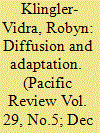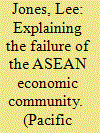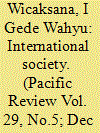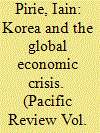| Srl | Item |
| 1 |
ID:
148308


|
|
|
|
|
| Summary/Abstract |
This study examines conditions under which states in East Asia engage in the development of regional institutions. It assumes that crucial external events and shocks, which produce specific historical breakpoints – critical junctures – constitute a significant breakpoint at which the regional states willingly elevated a path to develop regional institutions to a new level. The analysis of the development of regional institutions for a free trade area and food stock for emergency revealed that regional states in East Asia changed their views on the evolving reality created by external shocks and such changes led to the creation of new regional institutions.
|
|
|
|
|
|
|
|
|
|
|
|
|
|
|
|
| 2 |
ID:
148311


|
|
|
|
|
| Summary/Abstract |
Diffusion scholarship expects little adaptation of core elements of policy models. However, the empirical reality is different; diffusion of even highly regarded models, such as the Silicon Valley venture capital (VC) policy model, results in marked adaptation. This article demonstrates why the Silicon Valley VC model is necessarily adapted differently by policy-makers in the geographically, ethnically and economically proximate states of Hong Kong, Taiwan and Singapore. More specifically, these policy-makers' interventionist orientations, private sector financing preferences and international versus domestic firm promotion biases drive contextually rational – and unique – adaptations of the Silicon Valley VC policy model.
|
|
|
|
|
|
|
|
|
|
|
|
|
|
|
|
| 3 |
ID:
148306


|
|
|
|
|
| Summary/Abstract |
All reliable indicators suggest that ASEAN's (Association of Southeast Asian Nations) Economic Community (AEC) will not be successfully established by its 2015 deadline. Why? Against technocratic, realist and constructivist accounts, this article offers an explanation rooted in the political economy of ASEAN's member-states. Economic liberalisation agreements promote the rescaling of economic governance, involving regulatory changes that may radically redistribute power and resources. Consequently, they are heavily contested between coalitions of social and political forces, without outcomes reflecting the outcome of these struggles. The argument is demonstrated by exploring the uneven sectoral liberalisation achieved under the AEC, the constrained integration of ASEAN's energy markets, and the limited deregulation of skilled labour migration.
|
|
|
|
|
|
|
|
|
|
|
|
|
|
|
|
| 4 |
ID:
148310


|
|
|
|
|
| Summary/Abstract |
Realism has been the dominant conceptual approach to studying Indonesian foreign policy. This article, however, considers realist analyses to be insufficient since their emphasis on the struggle for power and security in the system of states has led to the neglect of the importance of perspectives which focus on order. To fill the gap it then intends to apply the English School perspective which focuses on the concept of international society to trace the nature and function of Indonesian foreign policy. Two cases are examined, including the Asian African Conference and Association of South East Asian Nations, to demonstrate the relevance of international society for policy ideas and action. The central argument is that the Indonesian elite worldview indicates that the creation and maintenance of order in international societies are ones which are prominent objectives legitimizing the conduct of Indonesia's external relations.
|
|
|
|
|
|
|
|
|
|
|
|
|
|
|
|
| 5 |
ID:
148307


|
|
|
|
|
| Summary/Abstract |
Korean policy-makers constructed the global economic crisis as a purely external threat to the domestic economy. This understanding of the crisis supported a selective retreat from neo-liberalism. More problematically, the construction of the crisis as an exogenous phenomenon allowed policy-makers to focus on maintaining short-term growth without seriously addressing the structural weaknesses of the economy that the crisis should have drawn attention to. Levels of household debt in Korea have risen since the crisis and are considerably higher than in the USA. Equally, the economy remains over reliant on exports as a source of growth.
|
|
|
|
|
|
|
|
|
|
|
|
|
|
|
|
| 6 |
ID:
148309


|
|
|
|
|
| Summary/Abstract |
This paper elucidates how domestic and external factors have shaped the negotiating policy of the Philippines in bringing about incremental gains not only for its benefit but also for other developing countries during the World Trade Organization (WTO) Agreement on Agriculture Doha Development Round (DDR). The internal factors include the following: (1) executive monopoly of the WTO negotiations; (2) issue-based fragmentation and dispersal of authority; (3) the autonomy and flexibility of the Philippine WTO negotiator; (4) the involvement of civil society in the WTO negotiations, and (4) the central role of the Department of Agriculture as the lead agency in the WTO negotiations. A major reason for this is attributed to an external factor which is the centrality of agriculture as a major WTO issue among developing countries. Other external factors, on the other hand, include the following: (1) the strong solidarity among developing countries and (2) the confinement to particular issues with regards to coalition-building. These factors helped to strengthen the bargaining leverage of the Philippines, a seemingly ‘weak’ country, vis-à-vis the developed countries in the WTO.
|
|
|
|
|
|
|
|
|
|
|
|
|
|
|
|